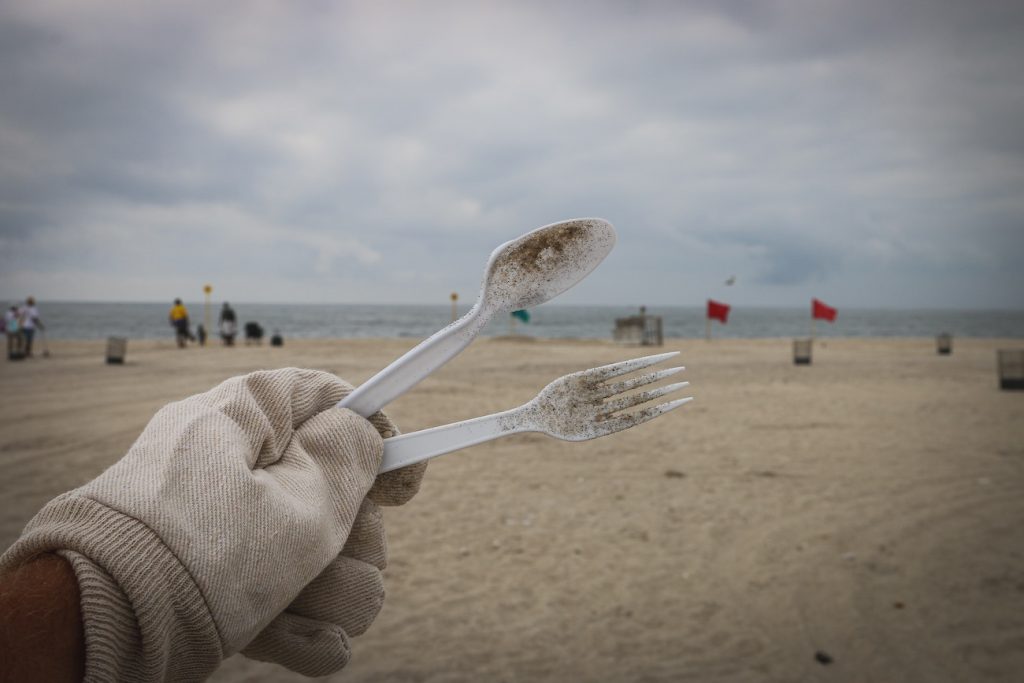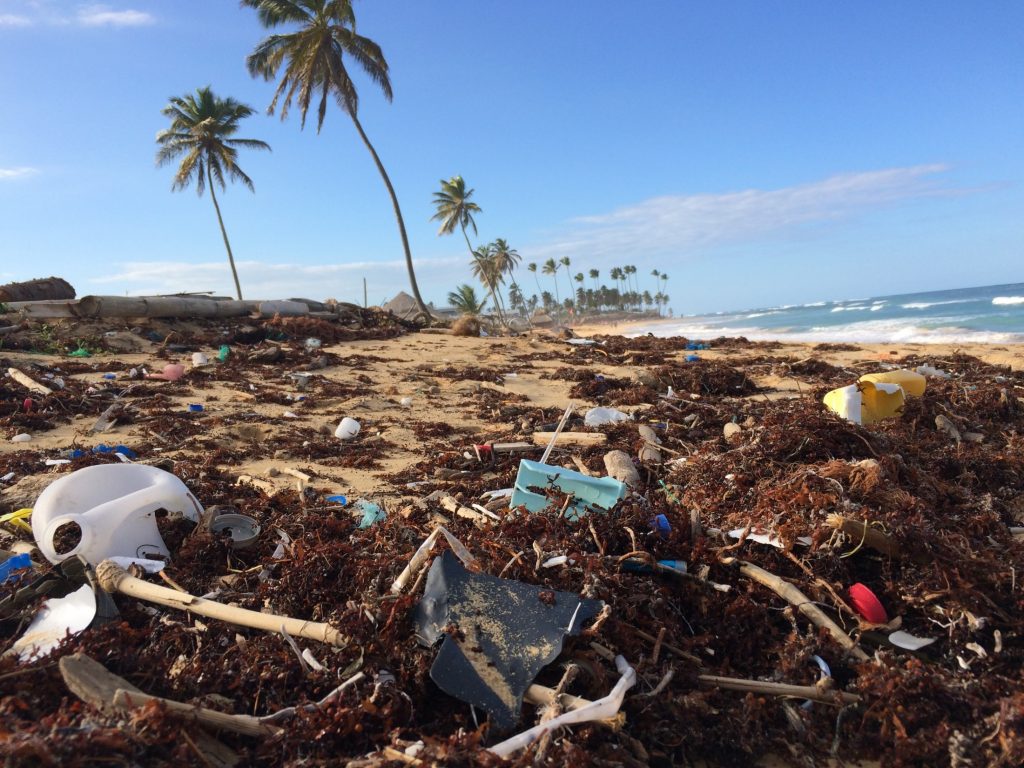Recently updated on March 5th, 2025 at 12:34 pm
Words by Trafalgar CEO, Gavin Tollman
I decided to write this article today, after reading in this morning’s Tribune De Geneve that on January 1st 2020 the city of Geneva will be eliminating single use plastics in all outdoor restaurants. I am incredibly fortunate to live in a forward-thinking city, and with it, in a country that does what is right for its people. This is a huge step in the right direction.
“A report issued this year proves we have officially entered the ‘plastic age‘, or The Anthropocene.”
Plastic pollution is now being deposited into the fossil record, with plastic layers in the earth’s core building up to such a level that they will have a lasting, and irreversible, impact on the earth’s internal makeup.
Plastic is all around us and often invisible to the unsuspecting eye. Cars and planes are, by volume, 50% plastic, whilst more clothing is made out of plastic such as polyester and nylon, than cotton or wool. Almost 300 million tonnes of the stuff is produced every single year, 50% of which is used just once and then throw away.


But therein lies the problem, because the reality is, there is no ‘away’. One of the most deplorable single use plastic facts is that 91% of plastic is not recycled. Rather, it gets burnt, sent to landfill, or makes its way into our waterways and eventually the ocean. A staggering 8 million tonnes of plastic ends up here each year, the equivalent of 630 billion single use plastic bottles, creating the now known catastrophic consequences for not just animal and marine life, but humans too. Last year, whilst visiting Ryley Webster of Sustainable Coastlines, he shared a particularly alarming piece of information with me; when fish ingest plastic, excess oestrogen is released into their systems. For those who rely on a high seafood diet, as many do around the world, the impact of this is already being seen. Young girls are entering puberty prematurely, whilst boys are developing breasts.
RELATED CONTENT: Carlsberg have created the world’s first paper beer bottle
And the impacts of plastic on human health don’t stop there. Many of us have likely heard of the product BPA, or Bisphenol A, which is a chemical added to plastic to make it more durable. BPA is found in countless single use plastic items (unless advertised otherwise) including food packaging, which then leeches into our food and enters the human body. The impacts of this have been linked to countless health issues; infertility, obesity, breast and prostate cancer and neurological problems such as ADHD amongst them.
“Societies reliance on plastic as a convenience product has reached a tipping point, but the good news is, change is afoot. Not just in Geneva, but all across the world, crossing borders and political divides, the public sentiment is being heard loud and clear – enough is enough”
The stats and evidence are literally pilling up at the doors of policy makers and corporations the world over, whilst the public are making their opinions clear through petitions such as the 2016 Greenpeace led call for a UK wide ban on microbeads. In just four months, over 365,000 people had signed – the largest environmental petition ever presented to government.


And so encouragingly, they are starting to listen. In the UK, microbeads have already been banned, whilst a further ban on straws, drink stirrers and cotton buds will come into effect in 2020. In France, a new law which will also come into play in 2020 will see a country wide ban on plastic cups, plates and utensils. And just this year, Canadian PM Justin Trudeau promised to eliminate SUPs such as bags and straws ‘from coast to coast’ by 2021. Across the world a total of 127 countries have now introduced new laws to regulate the use of the plastic bag – the face of the SUP revolt – whilst some of the world’s leading corporations and brands have also pledged to take action. Unilever, which collectively owns over 400 household brands, have pledged to halve their usage of new plastics by 2025, whilst Dutch beer giants Heineken, have committed to removing single use plastic rings and shrink wrap from their multipack cans from April 2020.
RELATED CONTENT: How to help the planet, one tree at a time
The intention is undoubtedly there, but you have to ask yourself – do these bans and pledges solve the SUP problem, or simply mask it? Governments and corporations across the world are quick to create policies and introduce bans to reduce the amount of plastic we as consumers use, but the issue is these do not take into consideration the entire life cycle of a plastic product. These do not regulate the poisonous gasses and chemicals created through the production and refinement of plastic, nor do they provide waste management solutions for third world and developing countries that are already drowning in the product.


Take the plastic bag for example. The use of this product has now been regulated in 127 countries – unquestionably a big win in the fight against SUP. But when you break this figure down further, loopholes quickly begin to appear. Of these 127 countries, only 55 have restricted the retail distribution of plastic bags in tandem with restrictions on manufacturing, production and imports. The remaining 72 countries include loopholes that categorically fail to curb overall plastic pollution, allowing manufacturers in these countries to still produce and export plastic bags elsewhere in the world. Almost no countries have restrictions on the plastic bag manufacturing and production process, with the exception of one – Cape Verde. In 2016 the country introduced a complete ban on plastic bags and since then, only biodegradable or compostable bags are allowed into the country.
“The solution here as I see it, is to treat the issue from the ground up. Imposing restrictions and regulations are both steps in the right direction, but more importantly it will take individual responsibility, as well as a shift in both lifestyle and life cycle attitudes, to make a real change.”
Together with TTC’s not for profit foundation TreadRight, JoinTrafalgar are working towards bringing this change into all facets of our business each and every day. Our goal is to eliminate, where we can, single use plastics from our trips, in our supply chains and in our offices worldwide, working towards a plastic free future by 2025.
The fascinating thing is when you stop and look at it, it is a hard undertaking, as plastics are so deep-seated in all of our day to day lives. Therefore, I have introduced a new phrase into my own personal approach – ‘one straw at a time’. If each one of us does our share, bit by bit, looking at our individual lives and making the necessary changes, I am inspired by what our accumulative, positive impact could be.
How are you reducing your reliance on single use plastic? Let us know in the comments below